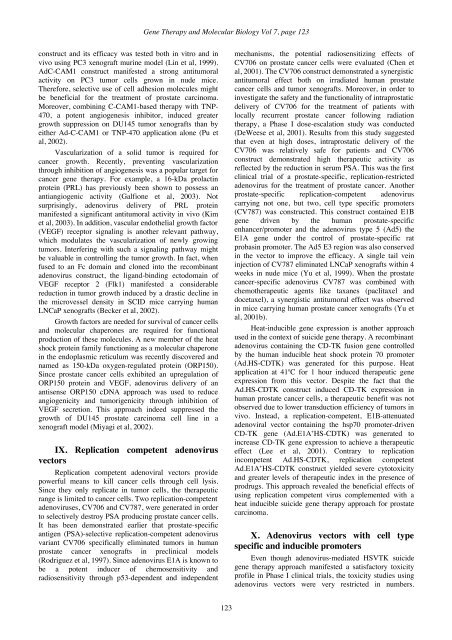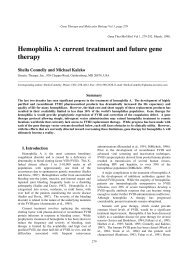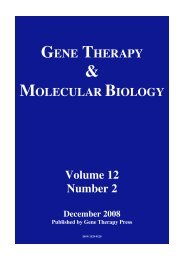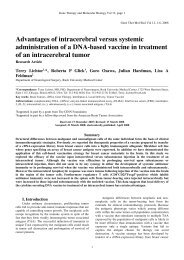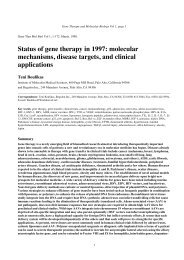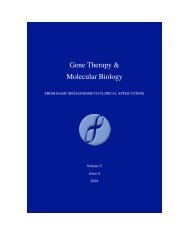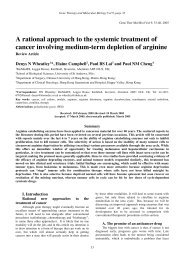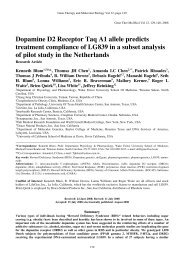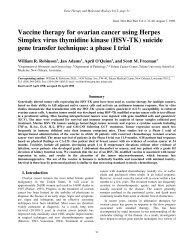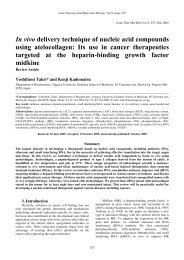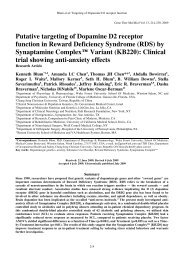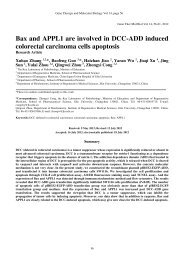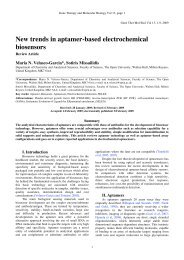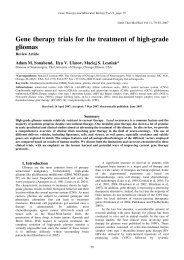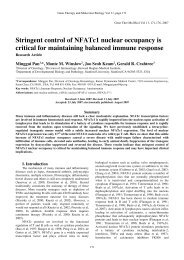GTMB 7 - Gene Therapy & Molecular Biology
GTMB 7 - Gene Therapy & Molecular Biology
GTMB 7 - Gene Therapy & Molecular Biology
Create successful ePaper yourself
Turn your PDF publications into a flip-book with our unique Google optimized e-Paper software.
<strong>Gene</strong> <strong>Therapy</strong> and <strong>Molecular</strong> <strong>Biology</strong> Vol 7, page 123construct and its efficacy was tested both in vitro and invivo using PC3 xenograft murine model (Lin et al, 1999).AdC-CAM1 construct manifested a strong antitumoralactivity on PC3 tumor cells grown in nude mice.Therefore, selective use of cell adhesion molecules mightbe beneficial for the treatment of prostate carcinoma.Moreover, combining C-CAM1-based therapy with TNP-470, a potent angiogenesis inhibitor, induced greatergrowth suppression on DU145 tumor xenografts than byeither Ad-C-CAM1 or TNP-470 application alone (Pu etal, 2002).Vascularization of a solid tumor is required forcancer growth. Recently, preventing vascularizationthrough inhibition of angiogenesis was a popular target forcancer gene therapy. For example, a 16-kDa prolactinprotein (PRL) has previously been shown to possess anantiangiogenic activity (Galfione et al, 2003). Notsurprisingly, adenovirus delivery of PRL proteinmanifested a significant antitumoral activity in vivo (Kimet al, 2003). In addition, vascular endothelial growth factor(VEGF) receptor signaling is another relevant pathway,which modulates the vascularization of newly growingtumors. Interfering with such a signaling pathway mightbe valuable in controlling the tumor growth. In fact, whenfused to an Fc domain and cloned into the recombinantadenovirus construct, the ligand-binding ectodomain ofVEGF receptor 2 (Flk1) manifested a considerablereduction in tumor growth induced by a drastic decline inthe microvessel density in SCID mice carrying humanLNCaP xenografts (Becker et al, 2002).Growth factors are needed for survival of cancer cellsand molecular chaperones are required for functionalproduction of these molecules. A new member of the heatshock protein family functioning as a molecular chaperonein the endoplasmic reticulum was recently discovered andnamed as 150-kDa oxygen-regulated protein (ORP150).Since prostate cancer cells exhibited an upregulation ofORP150 protein and VEGF, adenovirus delivery of anantisense ORP150 cDNA approach was used to reduceangiogenicity and tumorigenicity through inhibition ofVEGF secretion. This approach indeed suppressed thegrowth of DU145 prostate carcinoma cell line in axenograft model (Miyagi et al, 2002).IX. Replication competent adenovirusvectorsReplication competent adenoviral vectors providepowerful means to kill cancer cells through cell lysis.Since they only replicate in tumor cells, the therapeuticrange is limited to cancer cells. Two replication-competentadenoviruses, CV706 and CV787, were generated in orderto selectively destroy PSA producing prostate cancer cells.It has been demonstrated earlier that prostate-specificantigen (PSA)-selective replication-competent adenovirusvariant CV706 specifically eliminated tumors in humanprostate cancer xenografts in preclinical models(Rodriguez et al, 1997). Since adenovirus E1A is known tobe a potent inducer of chemosensitivity andradiosensitivity through p53-dependent and independentmechanisms, the potential radiosensitizing effects ofCV706 on prostate cancer cells were evaluated (Chen etal, 2001). The CV706 construct demonstrated a synergisticantitumoral effect both on irradiated human prostatecancer cells and tumor xenografts. Moreover, in order toinvestigate the safety and the functionality of intraprostaticdelivery of CV706 for the treatment of patients withlocally recurrent prostate cancer following radiationtherapy, a Phase I dose-escalation study was conducted(DeWeese et al, 2001). Results from this study suggestedthat even at high doses, intraprostatic delivery of theCV706 was relatively safe for patients and CV706construct demonstrated high therapeutic activity asreflected by the reduction in serum PSA. This was the firstclinical trial of a prostate-specific, replication-restrictedadenovirus for the treatment of prostate cancer. Anotherprostate-specific replication-competent adenoviruscarrying not one, but two, cell type specific promoters(CV787) was constructed. This construct contained E1Bgene driven by the human prostate-specificenhancer/promoter and the adenovirus type 5 (Ad5) theE1A gene under the control of prostate-specific ratprobasin promoter. The Ad5 E3 region was also conservedin the vector to improve the efficacy. A single tail veininjection of CV787 eliminated LNCaP xenografts within 4weeks in nude mice (Yu et al, 1999). When the prostatecancer-specific adenovirus CV787 was combined withchemotherapeutic agents like taxanes (paclitaxel anddocetaxel), a synergistic antitumoral effect was observedin mice carrying human prostate cancer xenografts (Yu etal, 2001b).Heat-inducible gene expression is another approachused in the context of suicide gene therapy. A recombinantadenovirus containing the CD-TK fusion gene controlledby the human inducible heat shock protein 70 promoter(Ad.HS-CDTK) was generated for this purpose. Heatapplication at 41 o C for 1 hour induced therapeutic geneexpression from this vector. Despite the fact that theAd.HS-CDTK construct induced CD-TK expression inhuman prostate cancer cells, a therapeutic benefit was notobserved due to lower transduction efficiency of tumors invivo. Instead, a replication-competent, E1B-attenuatedadenoviral vector containing the hsp70 promoter-drivenCD-TK gene (Ad.E1A + HS-CDTK) was generated toincrease CD-TK gene expression to achieve a therapeuticeffect (Lee et al, 2001). Contrary to replicationincompetent Ad.HS-CDTK, replication competentAd.E1A + HS-CDTK construct yielded severe cytotoxicityand greater levels of therapeutic index in the presence ofprodrugs. This approach revealed the beneficial effects ofusing replication competent virus complemented with aheat inducible suicide gene therapy approach for prostatecarcinoma.X. Adenovirus vectors with cell typespecific and inducible promotersEven though adenovirus-mediated HSVTK suicidegene therapy approach manifested a satisfactory toxicityprofile in Phase I clinical trials, the toxicity studies usingadenovirus vectors were very restricted in numbers.123


